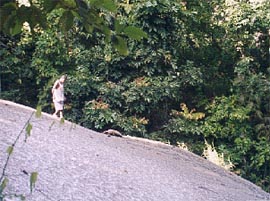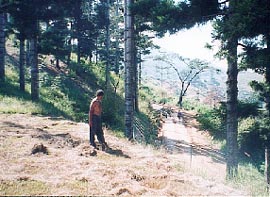Adventures in Papua New Guinea
This week the Captain disembarks from the airplanes and gets down to business in Papua New Guinea. Join him as his adventures continue.
Pull out a map of Papua New Guinea. Now give it a good look. Run your hands from the central highlands down to the southern marshes and on up to the northern coastal areas. Port Moresby, the capital, might spring to mind because of its relatively large size, but likely little else will.
 We had just such a map spread out on the office coffee table of my contact in Port Moresby (Moresby). (Such contacts often can provide a means to ease into the offices of local politicians, respected citizens in power, or other such VIPs. Almost all are real characters; usually ex-pats, sleazy, talk like used car salesmen on speed, and always come armed with the knowledge of whom to bribe and when.)
We had just such a map spread out on the office coffee table of my contact in Port Moresby (Moresby). (Such contacts often can provide a means to ease into the offices of local politicians, respected citizens in power, or other such VIPs. Almost all are real characters; usually ex-pats, sleazy, talk like used car salesmen on speed, and always come armed with the knowledge of whom to bribe and when.)
My man in Moresby was indeed an ex-pat. He had many of the above traits and even an attempt at a little bit of class: silk shirt, cheap pants - made to look expensive, and Cigar Aficionado on the table next to the map.
I was asking his advice on travel preparations.
"Goroka is a wonderful place," he said of Papua New Guinea's (PNG) number one coffee producer in the Eastern Highlands Province, "but you must remember to stay on the one main road. If you stray off to either side, your head comes off."
He then put his finger over the southern marshland area of Malalaua and added, "For here, don't worry, I can provide an armed guard to ride in the car. Just be sure not to stop for anyone."
Though that map may be unassuming, PNG as a whole is not. It is the lack of rationality often complimented by uncertainty that can make travel in this place of amazing diversity - both ethically and geographically - quite an adventure.
I'd eventually venture to both of these places. But let me begin in Moresby...
I think it was the story of the bungled fast food chicken outlet robbery - as told by an Australian ex-pat as we waited for a flight to Moresby from Cairns - that first got my attention. This ex-pat lives in Moresby.
"Give me the keys!" screamed the pistol-wielder on the driver's side. "Give me the keys!"
The ex-pat and his girlfriend were awaiting their to-go order in the drive-thru line when two pistols emerged through both front windows. You see, the car was going to be the getaway car; a group of rascals were in the process of robbing the store and had failed to plan out all the details in advance.
 After exiting, he and his girlfriend slowly backed up away from the car. When they reached the restaurant's entrance doors, a man came bursting out through the doors, register in tow, slamming the Aussie to the ground.
After exiting, he and his girlfriend slowly backed up away from the car. When they reached the restaurant's entrance doors, a man came bursting out through the doors, register in tow, slamming the Aussie to the ground.
By then the cops had arrived; there was a massive shootout; and the rascals bolted in the car. Eventually it was retrieved - bullet holes and all. But no register.
"Welcome to Port Moresby," he said after the plane landed.
My arrival was much less dramatic, but certainly intriguing: Bill Skate, the Prime Minister of PNG, had just resigned.
Bill had apparently accepted some low interest loans from Taiwan that were valued around US$ 1 billion. This did not sit too well with China and, as a result, the PNG Parliament - a great benefactor of assistance from China, and not intent on giving Taiwan diplomatic recognition.
As a result, a vote of no-confidence was called. Bill, whose term was filled with allegations of corruption, instead decided to fold his hand and step down. A few days later the Parliament set a meeting to vote on a replacement.
The rumor going around was that if the current government did not hold during the vote, the citizens of Moresby would likely get a little testy and set the city ablaze.
On that overcast and rainy day, the police flooded the streets, all sporting large rifles to go with their spiffy blue uniforms. At various checkpoints throughout the city, questions were asked, papers were checked, and a general amount of toughness was impressed upon all passersby.
My driver and I were listening to the Parliament session on the radio when we came across this really mangy looking dog standing in the middle of the road. My driver wasn't really paying much attention and showed no signs of slowing down.
"Are you planning on hitting it?" I asked.
"It's not a very good dog," he surmised, and kept driving. He finally slowed down a bit and nudged the dog, sending him scampering off the road.
Then the announcement came over the radio: the government had held. I was actually happier that the dog had held.
In the end, nobody burned anything, well, outside of the typical amount of trash and abandoned cars for any given day in Moresby, that is.
On a subsequent trip to PNG, I noticed that the smiling picture of Bill had been taken down from the arrival terminal at Jackson Airport. There was no sign of the new prime minister's picture either - just some big holes in the wall.
Malalaua has holes as well, but they're all in its roads. From Moresby, I flew to Kerema, where I went against the recommendation of my contact and merely hired an unarmed driver.
"I'm from the Highlands," my driver said. He pulled at his thick and curly black beard. "We have a tradition of thick beards there. It is a sign of our manhood."
The drive to Malalaua from the airport was an hour and a half through parts of the Gulf Province that I am pretty sure National Geographic hadn't gotten around to covering yet; on all sides were lush jungles of dangling green vines and dense brush. The road was half mud, half rocks, and half holes, but the music on the tape deck was all reggae.
A recent flood had created more than the usual number of swamps as well. Mosquitoes, appearing to be on hormones, flew in one window and out the other. Displaced villagers hacked at reeds and vines with machetes as we rumbled past.
Occasionally, my driver would stop at a roadside stand and buy some betel nut. He'd bust open the green husks and toss the white seeds in his mouth. His lips would slowly change to a bright red as he chewed. His teeth and gums as well.
Chewing betel nut is a ritual in PNG and nearby areas of the South Pacific. Apparently it has a kind of a hallucinatory effect. Ala smokeless tobacco, the juice is not swallowed - it is spit out. After watching him devour seed after seed, I must admit that I did start to notice red stains all around where we parked the car.
Upon our arrival to Malalaua, one man claimed that some of the local villagers had pulled 14-foot alligators out of the nearby swamps the previous day. Big deal, I thought, there were 14-foot mosquitoes back on the road we came in on.
"You ever tried betel nut?" the man asked me, spitting a bit of the remnants of his own onto the ground.
"Never," I said. "But maybe another time."
I tried as best as I could to make it sound like I really wanted to.
Goroka might be the city without side streets, or, at least as my Moresby contact indicated, the city where you shouldn't venture to the side streets, but it also could be known as "the city of smoke."
 Go to the highest elevation in Goroka - maybe the hill where the main water reservoir is located - and look out across the valley. What you'll see are dark puffs of smoke rising intermittently all along the horizon.
Go to the highest elevation in Goroka - maybe the hill where the main water reservoir is located - and look out across the valley. What you'll see are dark puffs of smoke rising intermittently all along the horizon.
"We have a tradition of setting small fires," explained the Goroka Town Manager. "Some of it is burning trash, but we also just start small fires for entertainment."
But this wasn't my first learning experience in Goroka that day.
Earlier that afternoon I had met another contact - a skinhead in his 50s, or maybe 60s - at the Mandarin Chinese Restaurant, one of two restaurants in all of Goroka, Yes, even in the highlands, one can find shark fin soup.
He entered and came over to my table. As I sipped my tea, he started talking and never stopped. He was like a machine gun. In between telling me about his helicopters, influence with government officials, and native dancing girls, he mentioned that he had just returned from one of the nearby villages. It seems that some tribesmen of a certain village hacked off the limbs of a tribesman from an adjacent village. A problem later arose when it was learned that the wrong tribesman had gone under the knife, or rather, machete. The village was working with my contact at mitigating the issue.
At that time he was running for governor of the Eastern Highlands Province. Later I learned that he had lost. Maybe the citizenry couldn't keep up with his speed of speech?
But in getting back to the hill above Goroka, we were just about to head back down when the Town Manager pointed to a satellite dish next to some large pines and claimed, "This is for MTV."
I wasn't paying close attention. I had just noticed that he was a wearing a Chicago White Sox cap. But I remember thinking in the back of my head that he must be talking about some kind of Australian news channel.
"Do you like the White Sox?" I asked.
"The what?"
Indeed, it was pure fashion.
In the back of my mind during this exchange, I subconsciously rationalized that there is no way that a luxury like MTV could exist when such resources as education and clean water (the supply is shut off daily from 11PM to 5AM) had to be obvious priorities. (Along with keeping folks from hacking each other to pieces with machetes.)
But I was wrong.
Later in my room at the Bird of Paradise Hotel, I started going through the channels on my room's TV and sure enough I came across a telephone caller getting dating advice from a talk show host. It was indeed the real MTV.
A few minutes later, I got in the shower and found that the water was working. After all, it was still before 11PM.

